A well-crafted SEO proposal can be your agency’s secret ******. It’s not just a document; it’s a gateway to capturing the attention and trust of potential clients. Think of it as your agency’s polished elevator pitch, strategically designed to pique interest and win over prospects.
This article explores the art of writing a winning SEO proposal to elevate your agency’s client acquisition game. We’ll guide you through the key elements to include in your offers, helping you stand out in a sea of competitors. We’ll also equip you with expert insights and an SEO proposal sample.
By the end of this article, you’ll possess the tools necessary to craft a compelling proposal for SEO services. Before you know it, you’ll be leaving lasting impressions and securing lucrative partnerships.
What is an SEO proposal?
An SEO proposal, or an SEO offer, is your sales pitch. It’s a document that outlines the strategies, techniques, and services you plan to implement to improve the visibility and search engine rankings of your client’s website. Typically, the proposal is created when pitching SEO services to potential clients or outlining the scope of work for existing clients.
It serves as a roadmap for both the SEO agency (you) and the client. It also ensures that both parties have a clear understanding of the SEO campaign’s objectives, strategies, timelines, and costs. It helps establish expectations, align goals, and provide a basis for successful collaboration.
Here are a few things that don’t qualify as the SEO proposal itself, but can be part of it:
- SEO report: While an SEO report provides an analysis of a website’s current performance, it differs from the proposal. The report typically focuses on diagnosing existing issues and presenting key metrics. On the other hand, an SEO proposal is a proactive document that outlines the strategies and services proposed to achieve specific goals.
- SEO audit: An SEO audit is a comprehensive analysis of a website’s SEO factors. This includes the site’s technical aspects, content, on-page optimization, and backlink profile. It serves to identify areas for improvement and may include some fix tips for specific issues. But an SEO audit does not contain information about your agency, services, prices, customer reviews, etc. These are typically part of the SEO proposal instead.
- SEO consultation: An SEO consultation is a meeting or discussion between an SEO agency and a client to address the client’s SEO needs, goals, and potential strategies. It presents an opportunity to gather information and provide initial recommendations. However, it does not serve as a formal SEO offer that outlines detailed plans, timelines, and costs. Agencies often conduct these consultations after sending their proposals and pitching their services.
- SEO service packages: While SEO service packages may include some elements found in an SEO proposal, they are not the same. Service packages typically provide predefined sets of services with fixed prices, such as monthly SEO maintenance or a specific number of backlinks. Although they may include some strategy details, they don’t provide the comprehensive and customized approach that a proposal offers.
Again, even though the SEO proposal should not be confused with any of the services listed above, it often includes them as part of its documentation. Containing these services within it secures a comprehensive and individual approach to clients and their goals.
SEO proposal format
There are no strict rules or standardized formats for SEO proposals. They typically vary based on factors such as agency policies and preferences, the type of client, and the project itself.
The most common option is a text document, where you can include a detailed explanation of the proposed strategies, timelines, deliverables, and pricing. It’s recommended to use headings, subheadings, and bullet points to ensure the SEO services proposal is clear and well-organized.
To enhance the visual appeal of your SEO proposal for clients, consider combining text and visual elements. Incorporate charts, graphs, infographics, screenshots, or mock-ups to illustrate your strategies and expected outcomes. These visual elements help clients understand the proposed concepts more easily.
Here are some additional formats and elements that you can adopt:
- Presentation: Creating a presentation offers a more visual and interactive approach, making it easier to explain complex strategies and deliver case studies or examples.
- Interactive online proposal: This format allows you to create a visually rich and interactive experience for your clients. Incorporate clickable sections, embedded videos, and interactive elements to engage clients and differentiate your proposal from others.
- Video proposal: Video proposals add a personal touch to your communication with clients. They help you establish a direct connection, build rapport, and showcase your expertise and enthusiasm for the project.
You should always consider your client and their business type, and then tailor the proposal’s format accordingly. For example, if your client tends to have a more conservative mindset, opting for a standard text format with tables and graphs could be a suitable choice. On the other hand, if your client values creativity, an interactive SEO proposal might be the ideal option to wow them visually.
No matter which format you choose, the key is to provide a clear and comprehensive explanation of the SEO strategies, timelines, deliverables, and pricing that you are proposing to your client.
Do your homework: Prepare before writing an SEO proposal
Before writing an SEO proposal, you’ll want to take as many preparatory steps as is reasonably possible to ensure your client sees you as well-informed.
Learn more about your prospects and their niches
Before crafting an SEO proposal, it’s crucial to gather comprehensive information about your prospective clients and their specific industries or niches. Understanding their business goals, target audience, unique selling points, and pain points is key. You’ll need this information to tailor your proposal to their specific needs and demonstrate your understanding of their industry.
- Research the prospect’s industry by studying industry reports, news articles, and other online resources.
- Explore the prospect’s website, social media profiles, and online presence to understand their brand, products/services, and target audience.
If possible, conduct interviews with key stakeholders to gather insights about their business goals, challenges, and competitive landscape. This step usually follows the initial pitch, but if you have the opportunity to ask the client any business-related questions before sending a formal SEO proposal, it can greatly enhance your ability to tailor your offer effectively.
You can also use SE Ranking’s Competitive Research Tool to research your client’s website and its main competitors. Just enter your client’s website and run an analysis. The tool will provide you with important metrics such as Domain and Page Trust, organic and paid traffic, referring domains, backlinks, organic keywords, ads history, and more. You can also access a list of your client’s organic and paid competitors, whom you can also analyze with the tool and compare with the same tool.
Understanding the competitive landscape empowers you to identify potential gaps and opportunities for your clients to differentiate themselves and gain a competitive advantage. You can then construct an SEO proposal for clients that outlines tried-and-true strategies to help them outperform the competition and capture a larger share of the target audience.
Audit your client’s website
Conduct a website audit of your client’s website. While you can’t do this for every prospect due to time constraints, focus on the most promising ones. Then check their website for technical errors and assess the following:
- Broken links
- Site redirects
- Page load speed
- Mobile optimization
- URL structure
- Metadata
- Internal linking
- Crawlability issues
Whatever the audit finds will help you identify areas for improvement and devise strategies to enhance your client’s website’s SEO.
Remember that tools like SE Ranking’s Website Audit can help you assess your client’s site health and its optimization for search engines. The data in the Overview section should be enough for a quick check.
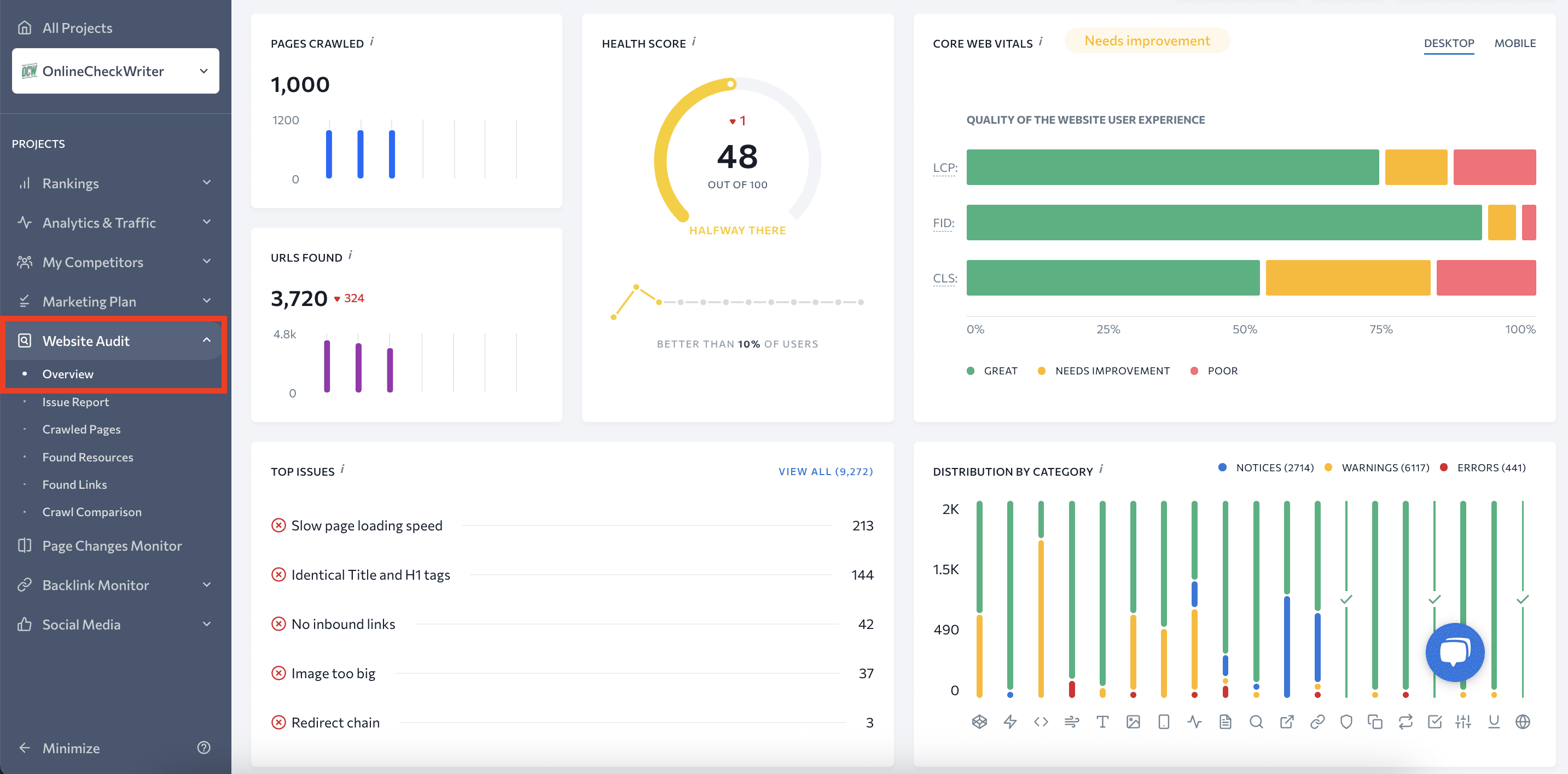
For a deeper analysis, go to the Issue Report section. It will show you each and every error detected. Each issue is grouped according to 19 distinct categories with marks to show its level of severity.
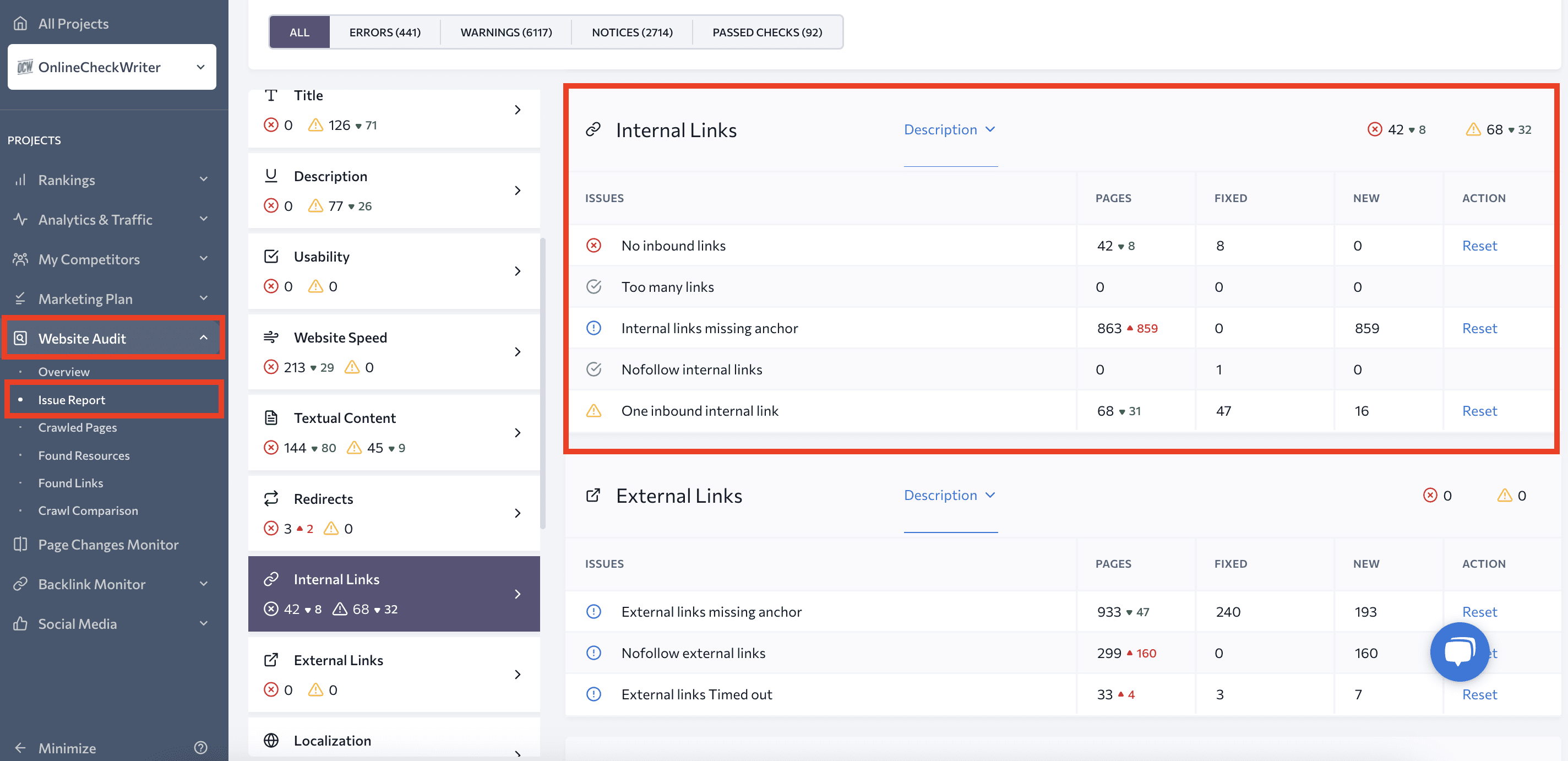
As in any other SE Ranking tool, you can export the data to expand your SEO proposal.
If you need this information in report format, use the SEO Report Generator. With it, you can craft visually appealing reports packed with data on your client’s rankings, competitors, website technical issues, and more. This approach allows you to present essential data in a clear format and demonstrate your commitment to the project.
SE Ranking also provides white-label SEO software, which means you can customize the platform as your own. Use your brand colors, logos, and domain name to make it seamless with your business identity. If you decide to share access with your client, they won’t see any references to SE Ranking.
What to include in your SEO proposal
When crafting an SEO proposal, it’s crucial to create a comprehensive document that grabs the attention of potential clients and addresses their pain points. As an agency, your proposal should demonstrate your expertise, highlight the value of your services, and present a personalized roadmap to achieve the client’s SEO goals.
In this section, we will explore the key elements to include in your SEO proposal, increasing your chances of winning clients and driving successful collaborations.
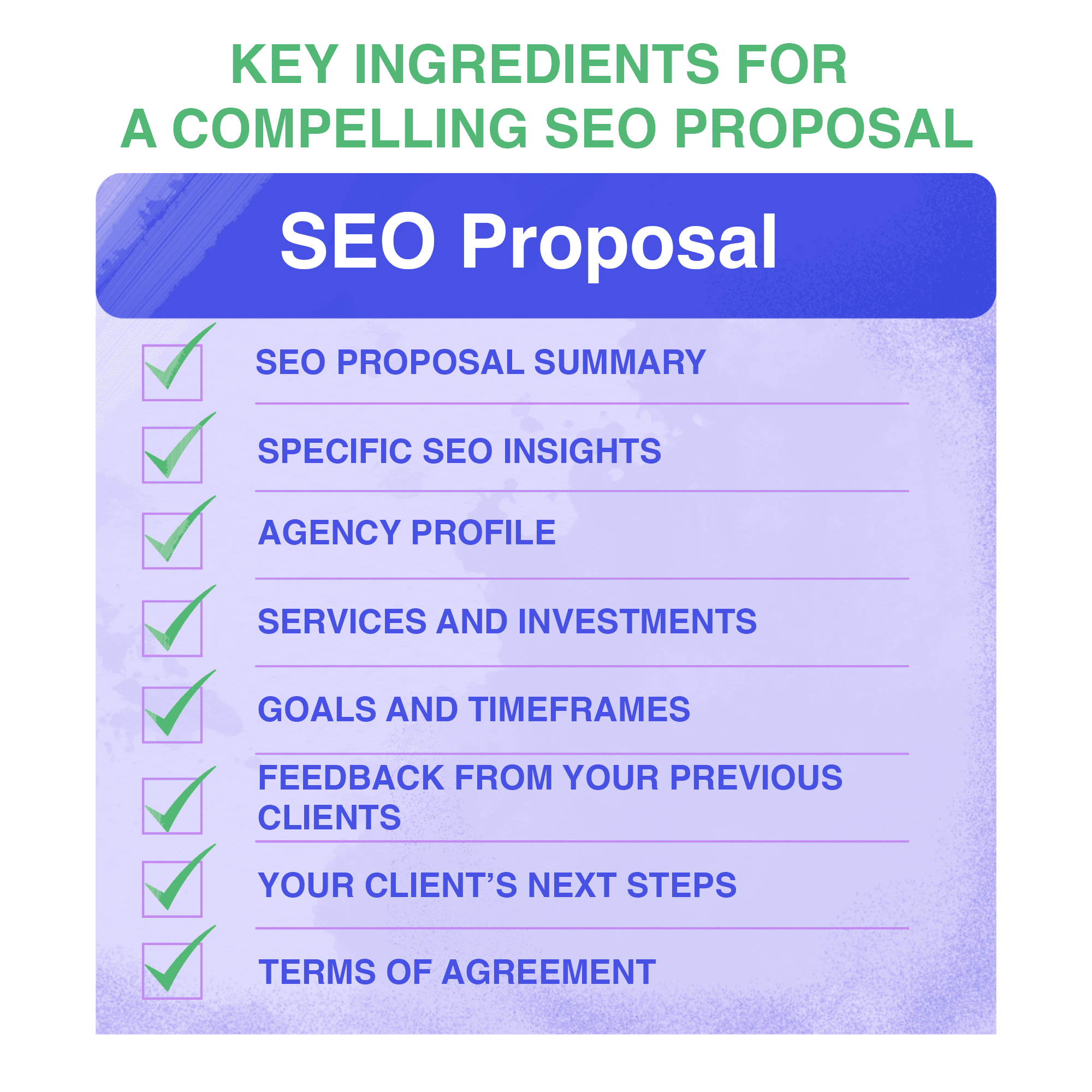
SEO proposal summary
The overview (or summary) section sets the tone for your entire proposal. It serves as the starting point that grabs the client’s attention from the outset.
In this section, you need to summarize the main points, objectives, and benefits your agency will provide. To ensure clarity, keep it focused and straightforward. Remember that not all clients are well-versed in the intricacies of SEO, so avoid overwhelming them with technical jargon. Instead, use clear and accessible language that allows prospects to quickly grasp the value you bring.
Example:
After carefully assessing your specific business needs, we’re thrilled to present our SEO proposal. This plan lays out our tailored strategy, crafted to elevate your online presence, increase organic traffic, and deliver tangible results. By using this approach, we will help you achieve a X% growth in organic traffic within X months. Expect to attract bottom-of-the-funnel leads by ranking in the top-5 for keywords like “X” and “X”.
Our team consists of seasoned professionals with extensive industry experience and a deep understanding of current trends. This makes us well-equipped to ensure maximum effectiveness for your campaign. By leveraging our proven expertise and innovative approaches, we can position your brand as a frontrunner in search results, establishing its leadership in the industry.
Specific SEO insights
This section is extremely important because it shows that your agency has conducted thorough research and analysis of your client’s current online performance. This personalized approach is a powerful way to build trust and confidence with your client.
Analyze their website and competitors and identify potential areas for improvement. Show your agency’s attention to detail and ability to provide valuable recommendations. This is where everything we focused on in the ‘Do your homework’ section will come in handy.
Example:
During our initial website audit, we closely examined your site, assessing technical aspects such as website structure, page load speed, mobile optimization, and URL hierarchy.
We discovered that:
- X% of your product pages aren’t indexed, leading to potential ranking challenges.
- Your page loading speed is X, lower than the industry average and search engine recommendations. This could impact user experience and engagement.
After researching your industry and target audience, we discovered that your clients heavily rely on Google reviews and local directories to find service providers. This indicates a need for a comprehensive local optimization strategy to boost your brand’s visibility in local search.
Our analysis also reveals untapped opportunities to target high-value keywords that can drive targeted traffic to your site.
Consider complementing your insights with charts and graphs to better convey your points.
Agency profile
Before you can convince your leads to trust your SEO agency, introduce yourself and showcase all the things that set your agency apart from others. This section is your chance to show off your unique qualities and give clients compelling reasons to choose your agency.
Present your agency with a brief overview of your background, experience, and credentials. Here’s how:
- Highlight key achievements.
- Mention notable clients and any industry recognition or certifications.
- Explain your core values and principles that drive results.
- Describe your unique value proposition, emphasizing what sets you apart from others.
This will build trust and credibility in the client’s mind.
Example:
At [Your Agency], we believe in taking a client-centered approach. We prioritize building strong, long-term relationships and taking the time to get to know your business’s specific needs and goals. We approach each project with care and are passionate about delivering outstanding results.
With over a decade of experience in the SEO industry, [Your Agency] has successfully helped [Number] clients across [Industries] achieve remarkable growth in their organic search visibility.
Our team is made up of highly skilled professionals with extensive experience in digital marketing and SEO. We hold [Certifications and Awards] that validate our expertise and commitment to staying at the forefront of industry best practices.
By choosing [Your Agency], you gain a trusted partner who is not only dedicated to your success but equipped with the expertise and innovative solutions needed to help you unlock the full potential of your online presence.
Now, you don’t necessarily need to present this information in plain text format. If your agency already has a well-designed mission statement, be sure to include it in your SEO services proposal. Here is how SE Ranking did it:
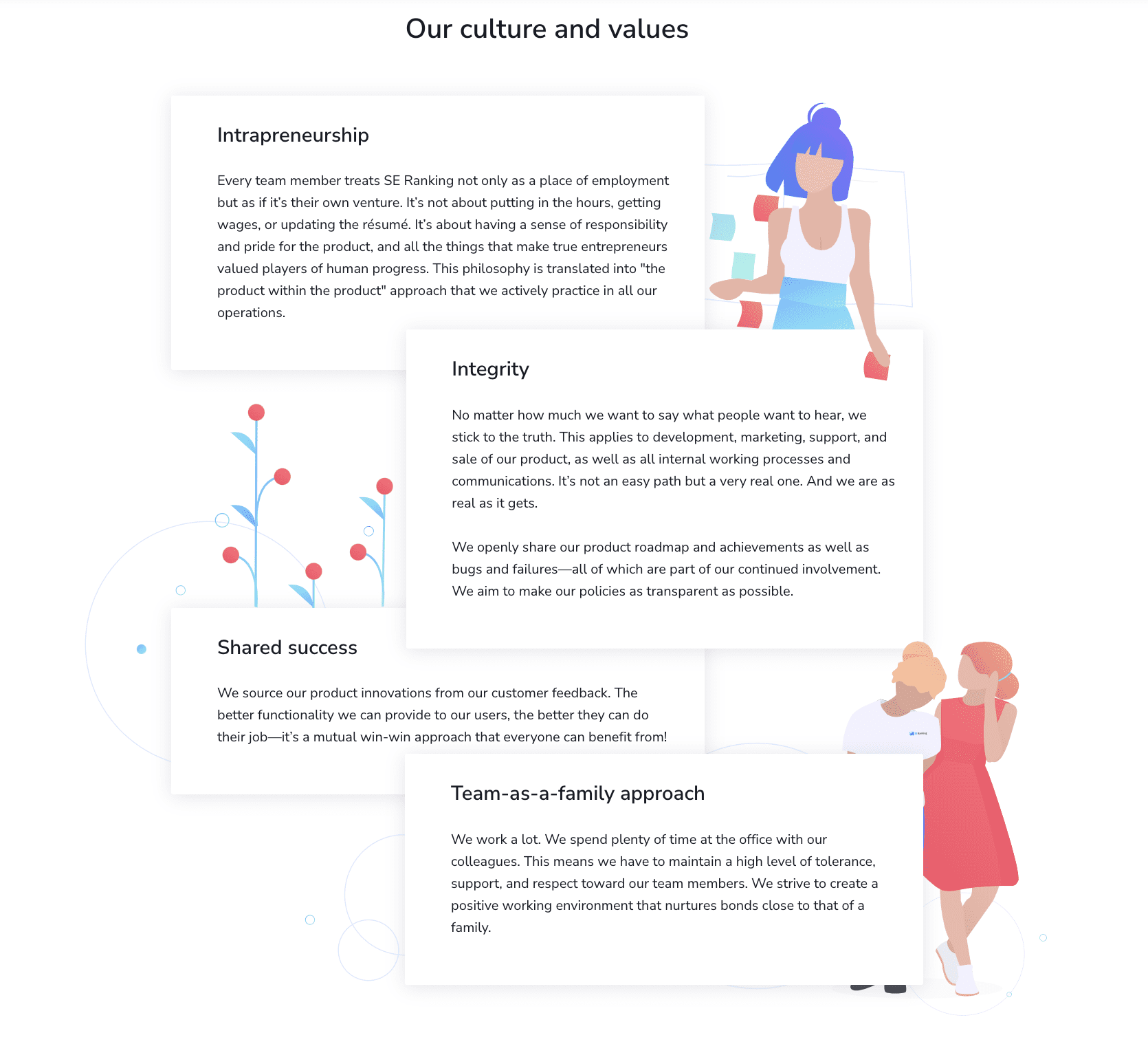
Services and investments
When writing this section:
- Clearly outline your agency’s services and emphasize their importance for the client’s SEO success.
- Address the client’s specific pain points and show them how your tailored solutions can address their challenges.
- Break down the SEO process into clear stages or milestones, explaining the specific tasks and deliverables involved.
- Include all relevant details, such as the number of blog posts, backlinks, reports, or audits to be delivered within a set timeframe.
- Mention the tools and techniques used to perform these tasks effectively.
Your agency should also educate the client about the broader impact of SEO, which extends beyond improving search rankings. Help your client understand that SEO plays a vital role in building online authority, enhancing brand visibility, and generating leads for long-term business growth.
At the end of this section, make a connection between the services you offer and the associated costs. When presenting the price, frame it as an investment rather than just a cost. By positioning your services as an investment in business growth, you highlight the long-term value and return on investment (ROI) your clients can expect to receive.
Clearly outline the investment required and fees involved. Be transparent about pricing structures, whether it’s a monthly retainer, project-based pricing, a customized package, or a pay-for-performance SEO model. Explain the value your agency offers at different price points and how the investment will deliver a positive ROI for the client.
Example:
Our agency is pleased to present our comprehensive SEO services and investment plan, specifically designed to propel your business forward.
We offer a variety of essential SEO services for your business’s success:
- Site audit: We will investigate issues with your website’s technical health and solve them to improve your business’s performance and help it grow.
- We’ll conduct X technical audits and fix X main issues during the next X months.
- Keyword optimization: We will identify the best keywords and incorporate them strategically into your website content to improve rankings and drive more traffic.
- We will optimize X blog posts with relevant keywords over the course of X months.
- Link building: We will build high-quality backlinks to your website to increase your traffic and enhance your reputation and domain authority.
- You’ll get XX backlinks from trustworthy domains within X months.
- Content creation: Our experts will craft high-quality, optimized blogs and content for landing pages, each providing value to your target audience.
- Your website will have XX new blog posts, XX new landing pages, and XXX unique product descriptions.
- SEO reporting: We will provide data-rich performance reports on your website’s organic traffic, keyword rankings, backlinks, etc.
- You’ll get reports every X days and have access to the project dashboard for real-time performance monitoring.
We are confident that you will consider the cost of the above-mentioned services as an investment in the growth and success of your business. We offer competitive pricing with a monthly retainer of $X, which can translate into a generous return on your investment.
Goals and timeframes
Set clear and realistic goals that align with the client’s objectives. Outline the specific metrics that you plan to track and set a realistic timeline for achieving these goals. This helps manage client expectations and ensures that both parties have a shared understanding of the project’s timeline.
Follow the SMART system:
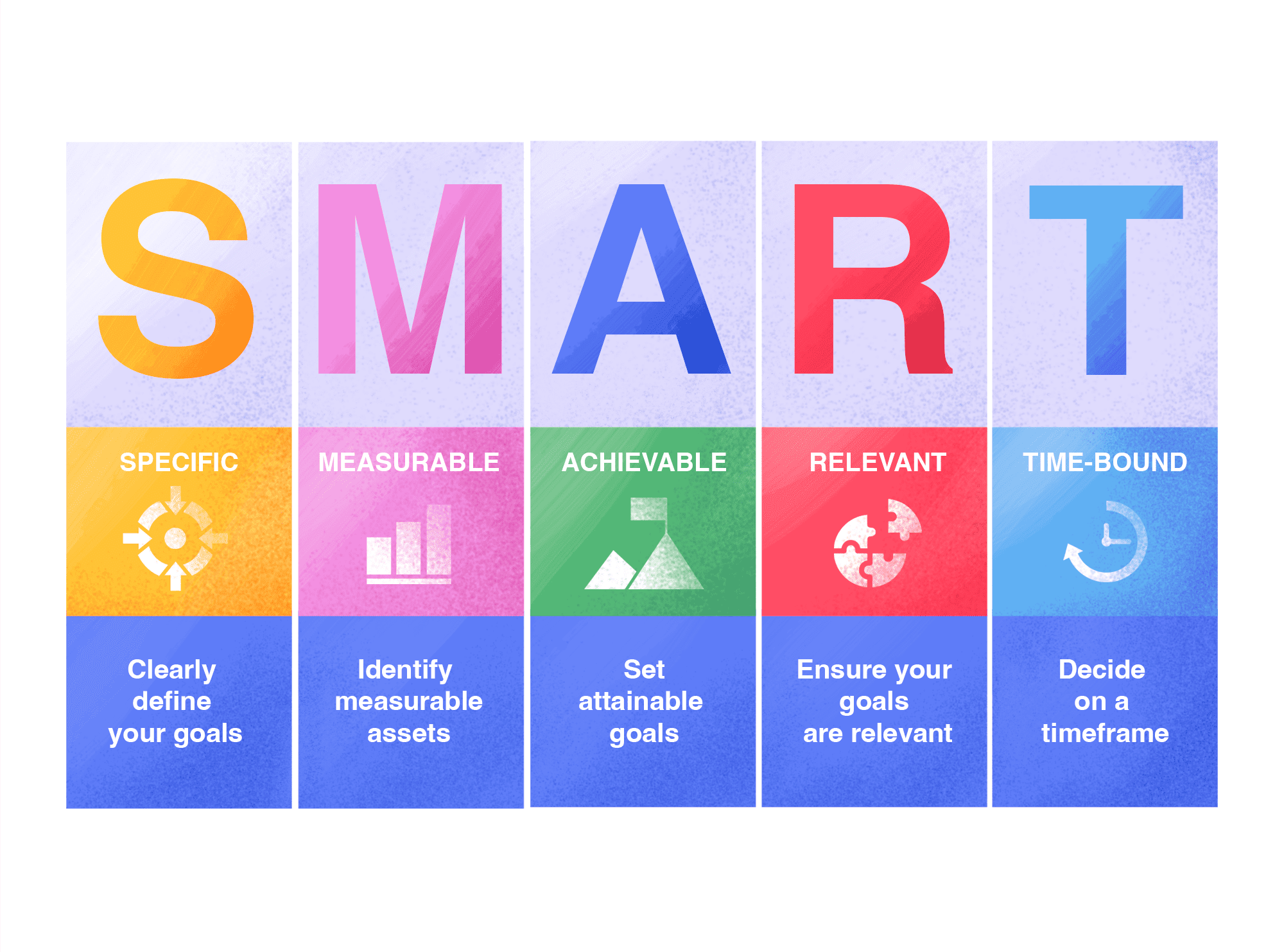
- S stands for specific: Clearly define what you want to achieve through your SEO campaign. Avoid vague goals like “increase website traffic.” Instead, aim for specific objectives such as “increase organic traffic by 30% in six months.”
- M stands for measurable: Ensure your goals are quantifiable and can be tracked. For example, you can aim for a certain number of keywords ranking in the top 10 or a 30% increase in organic traffic. You can also track conversion rates or lead generation. Measurable goals help you assess your SEO efforts more accurately.
- A stands for achievable: Set realistic and attainable goals based on your client’s website performance, industry competition, and available resources. While it’s important to challenge yourself, avoid setting unattainable goals that might lead to client frustration. Strike a balance between ambition and feasibility.
- R stands for relevant: Align your goals with the client’s broader business objectives. Consider how achieving these SEO goals will contribute to their overall marketing strategy and help drive business growth. Ensure that your SEO efforts address the client’s needs and expectations.
- T stands for time-bound: Set a specific timeframe for achieving your goals. This helps you stay focused and accountable for meeting deadlines. For example, you could aim to acquire 30 new backlinks within two months or improve keyword rankings within three months.
Example:
Our primary goal is to increase your website’s organic traffic by 30% within the first six months. To measure our progress, we will closely monitor key performance indicators such as website rankings for target keywords, organic traffic growth, and engagement metrics. Our timeline outlines a phased approach to ensure steady and sustainable growth.
Our team will regularly review both the goals and the timeline with you. We will provide updates and performance reports to track the campaign’s progress. We believe that transparency and effective communication are vital to ensuring that our SEO strategies align with your goals and expectations.
Feedback from your previous clients
Include social proof and testimonials from satisfied clients to build even more credibility and trust. Highlight any success stories, case studies, and positive feedback from past clients, especially if they have achieved overwhelmingly positive results through your SEO services. This will reassure the agency that you have a proven track record of delivering on your promises.
Example:
Here’s what our clients have to say about our SEO agency:
“Working with [Your Agency] has been a game-changer for our online visibility. Their expertise and dedication to our success helped us double our organic traffic in just three months.” – Client A
“We saw an immediate improvement in our search rankings after partnering with [Your Agency]. Their data-driven approach and attention to detail have made all the difference.” – Client B
Your client’s next steps
This section of your search engine optimization proposal serves to guide your clients on all the essential steps required to kickstart their campaign. By providing clear direction, you set the foundation for their progress.
To initiate the SEO campaign smoothly, it’s essential to present a comprehensive list of the information, access, and resources the agency requires. This list may include the following elements:
- Access to their website’s CMS
- Credentials for Google Analytics and Google Search Console
- Existing content assets
- Any other pertinent data
By communicating these prerequisites early on, you can smooth the onboarding process and ensure a painless start to the campaign.
Conclude your SEO proposal with a compelling сall to action, encouraging the agency to take the next step. Clearly outline the desired action, whether it’s scheduling a call, signing a contract, or requesting further information. Create a sense of urgency by emphasizing the benefits of taking prompt action.
Example:
We’re excited to be starting this SEO journey with you! To make your transition as smooth as possible, we’ve outlined the next steps you need to take. These steps are designed to kickstart our partnership and lay the groundwork for our SEO campaign.
- Signing the contract: To formalize our partnership, please review, sign, and return the provided contract. This agreement outlines our mutual commitments and sets the framework for our work together.
- Providing necessary access and information: To hit the ground running, we’ll need your website CMS access for implementing on-site SEO changes. We will also need your Google Analytics and Search Console credentials to analyze and monitor your website’s performance, enabling strategic improvements. Please provide any other relevant data as well.
- Onboarding session: Once we have all the resources we need, we’ll schedule an onboarding session. This meeting will allow us to understand your business more deeply, align on goals, and answer any questions you may have.
- Planning session: Following the onboarding session, we’ll conduct a planning session to create our comprehensive SEO strategy. During this phase, we’ll map out the campaign milestones, set deadlines, and establish KPIs.
To kickstart our partnership, please schedule a call with our team or simply sign and return the attached contract. Remember, the sooner we begin, the quicker we can achieve tangible results for your business.
Terms of agreement
This section of the SEO proposal is crucial, as it defines the legal detail of your professional relationship with the client. It provides clarity on the nature and scope of services, payment terms, obligations of both parties, contract duration, and the dispute resolution process.
If possible, use simple language when crafting this section to ensure mutual understanding of terms. Clearly define industry-specific terms to avoid confusion. Mention parties of the agreement, services being offered, deadlines, and the responsibilities for each party.
Add the following sections:
- Payment terms: Clearly outline the payment structure, due dates, and any applicable late fees.
- Termination clause: Specify the conditions under which the agreement can be terminated by either party and the implications of termination.
- Dispute resolution: Define the process for resolving disputes that may arise from the agreement.
- Confidentiality clause: If necessary, include a section that assures the client that their sensitive information will be handled with the utmost confidentiality.
Example:
Terms of Agreement
This Agreement is made effective upon signing by and between [Your Agency] and [Client’s Name/Company].
1. Services: [Your Agency] agrees to provide search engine optimization (SEO) services as outlined in this proposal.
2. Payment Terms: The client agrees to pay a monthly retainer of $X on the 1st of each month. Payments more than five days late will incur a late fee of $Y.
3. Responsibilities: Both parties agree to fulfill their respective responsibilities as described in this proposal, with [Your Agency] executing SEO services and [Client’s Name/Company] providing necessary access, information, and timely payments.
4. Contract Duration: This Agreement shall commence on [start ****] and continue until [end ****] unless otherwise terminated by either party with written notice of 30 days.
5. Termination: Either party may terminate the Agreement by giving the other party written notice of termination. Upon termination, [Your Agency] will invoice for all services completed up to the termination ****.
6. Dispute Resolution: In the event of a dispute, parties agree to negotiate in good faith to resolve the issue. If it remains unresolved, the dispute will be settled by arbitration in the jurisdiction of [Your Agency’s location].
7. Confidentiality: [Your Agency] commits to keeping all proprietary client information confidential and secure, using it only for the purpose of providing contracted services.
Please read the above terms carefully. By signing below, you agree to the terms of this Agreement.
[Your Name/Position]
[****]
[Client’s Name/Position]
[****]
This contract is intended to be a clear and straightforward representation of our mutual professional understanding and serves to protect the interests of both parties. We look forward to a successful partnership.
Writing your SEO Proposal: Pro tips
We’ve gathered tons of invaluable insights from seasoned agencies and influential voices in the industry to bring you a treasure trove of wisdom. Our goal is to provide you with practical strategies and insider advice to help you create a winning search engine optimization proposal.
Try to make your SEO proposal clear and straightforward. Independent consultant Geoff Kennedy advises removing any superfluous details (i.e., the fluff).

Geoff Kennedy
Independent Сonsultant
The person reading it is unlikely to have the time or patience to read an essay, so you need to get your most important points across as efficiently as possible. The finer details can be discussed later, but if your proposal doesn’t win them over, they’re irrelevant.
Your proposal should clearly demonstrate how your SEO strategies and actions will support the client’s business goals. This is what Itamar Blauer from StudioHawk recommends focusing on in your SEO offer.

Itamar Blauer
Senior SEO Director
Most of the time, the people who you’re presenting to won’t understand the full extent and jargon behind SEO. What they care about most is how what you’re going to do will affect their goals, and this has to be reflected at every point across the proposal.
- Make the pricing structure clear
A clear and transparent pricing structure can be a determining factor for a client to choose your services. Ulrika Viberg from Unikorn recommends placing the pricing or investment details early on in the proposal and then repeating them in the end with more details.

Ulrika Viberg
Agency Owner and Senior SEO
When a client opens a proposal, the ONE thing they have on their mind is “how much will it cost?” If you provide them with those figures straight away, even if it’s a lot, they will keep reading more thoroughly to find out what they “will get for the money.
Another piece of advice regarding pricing is to give your clients the choice to settle either the price or the terms if possible. This is what Ross Tavendale from Type A Media offers for his small business clients. This approach ensures a mutual agreement where both parties feel satisfied with the deal.

Ross Tavendale
Managing Director
For our small business clients, this means either they get a £6k retainer, cancel anytime (client terms, our price), or a £4k retainer, locked for 12 months (our terms, client price). I also line item everything we will do as if a procurement company were buying pencils.
SEO should not be seen as a standalone service but as a part of a broader marketing strategy. Jef Van Gool from Sherlock SEO positions himself as a business consultant who can align the client’s SEO with their overall marketing efforts. You can also apply this positioning to make your proposal more appealing and effective.

I changed my route from selling SEO to being a business consultant as most companies don’t have their marketing aligned with SEO. It’s not just my goal to get my client found online but to make sure my client is sought after.
- Personalize your proposal
In an industry that can often feel impersonal and technical, a personal touch can make all the difference. Ulrika Viberg recommends introducing your team to the client to create a personal connection.

Ulrika Viberg
Agency Owner and Senior SEO
We try to present our team in a more personal way. SEO can be scary if you haven’t dealt with it before. Knowing that Ann in the team also loves horses and rides in her spare time makes her more human.
- Forecast potential results
To help clients visualize the potential benefits of your SEO services, provide them with an estimate of possible results. Anthony Barone from StudioHawk recommends using your client’s data for 12-month forecasting.

Anthony Barone
Co-Founder & Managing Director
Such forecasting will give your clients a reference point as to what can be achieved, as sometimes decision-makers can’t connect the dots as to SEO tasks and business goals.
And finally, here’s a piece of advice all the experts agree on: clearly explain what the client will get in the end and why each service that you provide is important.
Key takeaways
The process of creating a winning SEO proposal can be rewarding despite how challenging it can be. An effective proposal demands a strategic approach and deep understanding of the client’s needs. The tips and examples provided in this article are designed to help you craft offers that resonate with potential clients, stand out from the crowd, and win you new projects.
Now is the time to take this knowledge and apply it! Start creating persuasive, compelling SEO proposals to attract new clients eager to hire your agency.
